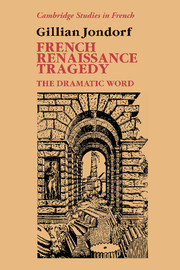1 - Allusiveness
Published online by Cambridge University Press: 22 September 2009
Summary
An obvious feature of any sixteenth-century French poetry, of whatever genre, is its allusiveness; this could hardly be otherwise, given the importance of imitation as a principle of poetic creation in the Renaissance, and the Pléiade reliance on a select, welleducated readership who would recognise and appreciate echoes and re-workings of classical models.
The effect produced on a reader by allusiveness depends, first, on the extent to which writer and reader share a common culture. Such a common culture could be assumed, for an educated class in Europe, for several centuries. It was based on the literature of Greece and Rome, and the Judaeo-Christian scriptures. One consequence of such a shared background is the shared possession of a repertory of ideas, myths, and images which, when used in poetry, do not necessarily constitute specific, intentional allusions to earlier literary texts. In a poem such as 'Cupid and my Campaspe playd, / At Cardes for kisses' there is an amusing anachronistic jolt between the playing cards and the figure of Cupid with 'quiver, bow and arrows, / His mother's doves, and team of sparrows', but these 'classical' appurtenances are not intended to remind the reader of any specific poem from older literature.
- Type
- Chapter
- Information
- French Renaissance TragedyThe Dramatic Word, pp. 9 - 28Publisher: Cambridge University PressPrint publication year: 1990



